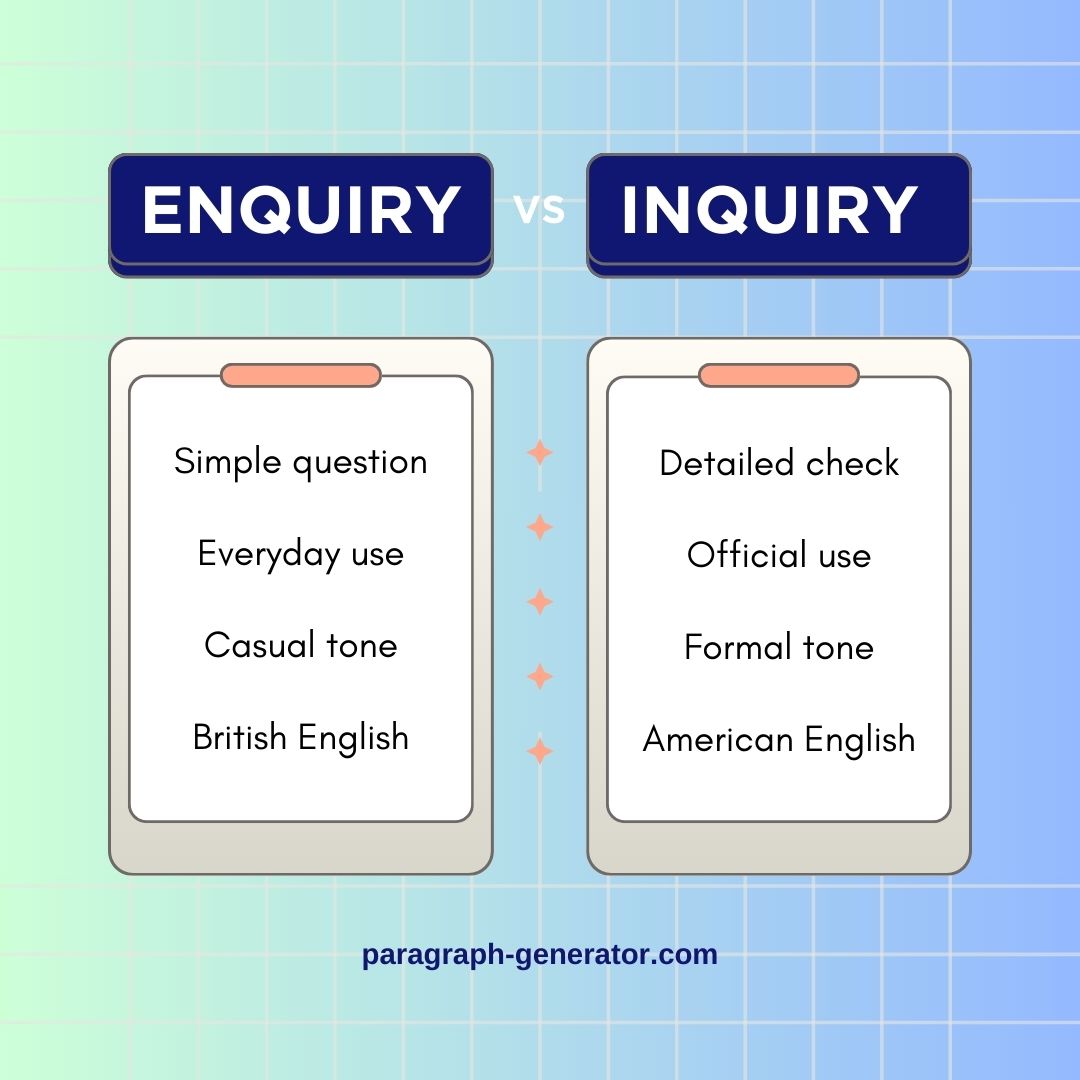Enquiry vs Inquiry ! What's the difference?
Why do we have both 'enquiry' and 'inquiry'? Explore the differences between these spellings and when to use each in your writing.
Curious why your British friend makes an enquiry, while your American colleague files an inquiry?
One word, two spellings, and a world of difference
Enquiry vs inquiry? These two spellings can seem confusing, especially when both words appear to mean the same thing.
Do these spellings also confuse you in academic writing?
If yes, in this blog, let’s explore the difference between inquire and enquire and understand when to use each word in types of sentences.
Enquiry vs Inquiry! What's the difference?

Enquiry and inquiry both words refer to the request for information about something. They have the same meanings.
In America “Inquiry” is a noun that refers to a question or process used to find out more information about something in formal investigations or other official situations.
In British “Enquiry” is a noun that refers to the request for more information about something in a general way.
It’s used when the speaker isn’t looking for a detailed answer.
Examples of inquiry:
- A government inquiry was launched to address the concerns.
- The school held an inquiry about student complaints.
Examples of enquiry:
- There was an enquiry into the history of the building.
- I made an enquiry about the holiday packages.
You can see the difference like enquiry is often used for general or casual questions, like simply asking for information.
And an inquiry usually indicates a more formal investigation or search for detailed answers.
The two terms highlight subtle but meaningful differences in British and American English usage.
Similarly to their root words when we use it as a verb we say Inquire and enquire. We can say this in an example like:
- I called the doctor to inquire about my blood test results.
- They sent an email to enquire about ticket prices for the concert.
When to use inquiry:
In simple terms as I said earlier, inquiry is used when you’re talking about a more formal process of seeking information, usually for a serious purpose.
It’s like a kind of questioning that goes deeper like when you're investigating something, whether it's for a business, legal matter, or an academic project.
For example, if you're looking into why a product failed in the market, you'd conduct an inquiry. This isn't just asking a casual question.
It's about gathering details in a way to uncover details. Like:
- "The company launched an inquiry into the cause of the data breach." (Formal investigation)
- "The police are conducting an inquiry into the missing person's case." (Official investigation)
When to use enquiry:
Well again in simple terms, enquiry is used when you're asking for information, but it’s usually in a less formal or official context compared to inquiry.
This is the word you'd choose for everyday situations or when you’re simply requesting information without the need for deep investigation or formality.
For example, if you’re contacting a service provider about something simple—like asking about their hours, pricing, or availability.
Here enquiry fits perfectly. You’re just trying to get a quick answer to a straightforward question. Like:
- I made an enquiry about the pricing for the new gym membership.
- He sent an enquiry to the car rental company asking about the weekend discounts.
Don’t get confused in academics
There are so many commonly confusing words like “to or too,” that exist and when we use them in our writing.
We get confused and mix up these similar words.
We might end up using the wrong one, which can unintentionally change the meaning and lead to misunderstandings.
In academic work, even small mistakes can affect how professional and reliable our writing appears.
That's why writing tools are so helpful.
They guide us in choosing the right words and ensure our paragraphs writing is accurate.
Whether we're working on essays, research papers, or assignments, tools like Free ChatGPT, paragraph writer, and a grammar checker help us create error-free content by catching those small differences and ensuring we sound clear and polished every time.
These tools are also valuable when we need to write content.
We might have ideas but lack the right words. In such cases, we can use these tools to expand our paragraphs or restructure and rewrite sentences for better clarity.
Final words
You can easily use AI tools to help with both brainstorming and editing your work. They make sure your ideas come out clearly and correctly.
Just keep in mind, English has a lot of common confusing words, like enquiry vs inquiry.
If you're not sure about these subtle differences, it's easy to mix them up.
Luckily, AI tools can spot these mistakes and fix them, helping you stay on track and making your writing more polished.
